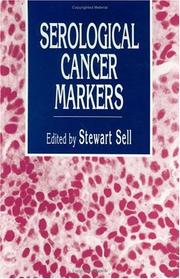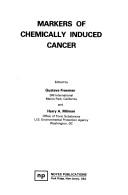| Listing 1 - 10 of 110 | << page >> |
Sort by
|

ISBN: 0896032094 Year: 1992 Publisher: Totowa, N.J. Humana Press
Abstract | Keywords | Export | Availability | Bookmark
 Loading...
Loading...Choose an application
- Reference Manager
- EndNote
- RefWorks (Direct export to RefWorks)
Book
Year: 2019 Publisher: Bethesda, Md. U.S. Department of Health and Human Services, National Institutes of Health, National Cancer Institute
Abstract | Keywords | Export | Availability | Bookmark
 Loading...
Loading...Choose an application
- Reference Manager
- EndNote
- RefWorks (Direct export to RefWorks)
Book
ISBN: 3437114964 Year: 1993 Publisher: Stuttgart ; New York Fischer
Abstract | Keywords | Export | Availability | Bookmark
 Loading...
Loading...Choose an application
- Reference Manager
- EndNote
- RefWorks (Direct export to RefWorks)
Book
ISBN: 2842997891 9782842997892 Year: 2006 Publisher: Issy-les-Moulineaux: Elsevier,
Abstract | Keywords | Export | Availability | Bookmark
 Loading...
Loading...Choose an application
- Reference Manager
- EndNote
- RefWorks (Direct export to RefWorks)

ISBN: 0815509723 Year: 1984 Publisher: Park Ridges Noyes
Abstract | Keywords | Export | Availability | Bookmark
 Loading...
Loading...Choose an application
- Reference Manager
- EndNote
- RefWorks (Direct export to RefWorks)
Book
ISBN: 9789175197791 Year: 2012 Publisher: Linkopings Universitet
Abstract | Keywords | Export | Availability | Bookmark
 Loading...
Loading...Choose an application
- Reference Manager
- EndNote
- RefWorks (Direct export to RefWorks)
This book presents a comprehensive study on stage T1 urinary bladder carcinoma (UBC) based on a population-based cohort from the Southeast Healthcare Region in Sweden. The research investigates factors involved in tumor development and progression, aiming to identify prognostic markers for recurrence and progression in patients with primary T1 urothelial carcinoma of the bladder. The study utilizes archived tumor tissues and conducts various analyses, including light microscopy, immunohistochemistry, and genetic testing. Key findings include a high recurrence rate of 80% and a progression rate of 39%, with tumor infiltration and p16 staining identified as significant factors for tumor progression. The book is intended for medical professionals and researchers in oncology and pathology.
Book
ISBN: 1617616109 9781617616105 9781617615511 161761551X Year: 2011 Publisher: Hauppauge, N.Y.
Abstract | Keywords | Export | Availability | Bookmark
 Loading...
Loading...Choose an application
- Reference Manager
- EndNote
- RefWorks (Direct export to RefWorks)
Tumor proteins. --- Proteins --- Tumor markers
Book
ISBN: 2817804457 Year: 2014 Publisher: Paris, France : Springer,
Abstract | Keywords | Export | Availability | Bookmark
 Loading...
Loading...Choose an application
- Reference Manager
- EndNote
- RefWorks (Direct export to RefWorks)
La notion de biomarqueur est de plus en plus utilisee en oncologie. Elle consiste a identifier des elements biologiques pouvant avoir une utilite diagnostique, pronostique et therapeutique ; Les biomarqueurs sont au cœur du Plan Cancer et representent une evolution majeure en oncologie ouvrant la voie de la personnalisation therapeutique. Dans cet ouvrage, sera presentee la definition des biomarqueurs puis leur declinaison dans les domaines de la genetique tumorale, du polymorphisme genetique avec leurs consequences sur les therapies du cancer. Les biomarqueurs innovants en matiere de diagnost
Book
ISBN: 3036566481 303656649X Year: 2023 Publisher: Basel, Switzerland : MDPI - Multidisciplinary Digital Publishing Institute,
Abstract | Keywords | Export | Availability | Bookmark
 Loading...
Loading...Choose an application
- Reference Manager
- EndNote
- RefWorks (Direct export to RefWorks)
Liquid biopsy shows promise for cancer screening and diagnostics. This reprint collects recent scientific literature on the identification and application of tumor biomarkers in biological fluids to improve the diagnosis of cancer and the identification of optimal therapeutic strategies.
Tumor Markers, Biological. --- Cancer --- Diagnosis. --- Treatment.
Book
Year: 2010 Publisher: Bruxelles: UCL,
Abstract | Keywords | Export | Availability | Bookmark
 Loading...
Loading...Choose an application
- Reference Manager
- EndNote
- RefWorks (Direct export to RefWorks)
Circulating proteic biomarkers or tumor markers are secreted or released by tumor cells or their environmental cells and they have a variable specificity. Today the most widely used marker for breast cancer is the circulating fragments of the Polymorphic Epithelial Mucin MUCI (MUC1- PEM) Cancer Antigen( CA 15-3).ln the breast cancer, Mucin MUCI is aberrantly glycosylated ,overexpressed and released into the circulation in the breast cancer. Two monoclonal antibodies recognize the same motif of MUCl gene product: 115D8 and DF3. The CA 15-3 blood assay based on chemiluminescent assays is a two-site enzyme immunoassay (sandwich type) that uses antibodies 115D8 and DF3. CA 15 -3 is neither specific of cancer in general or breast diseases. ln fact it can be increased in various benign or cancerous diseases. Level of CA 15-3 before any treatment is an essential reference value if one wishes t is to achieve a further follow-up but has no point in screening or monitoring of carcinoma in situ. In 2004-2005 the incidence of breast cancer in Belgium was the highest of all member states of the European Union. Various factors would influence the occurrence of breast cancer: age, genetic predisposition, the lifestyle, hormone replacement therapy. College of Oncology of the Federal Public Health and the Centers of Expertise in Health Care (KCE) have established national guidelines in order to prevent breast cancer: mammography is recommended every 2 years among women between 50-69 years old Les marqueurs tumoraux (ou protéiques) circulants sont des molécules sécrétées ou libérées par les cellules tumorales ou par leur environnement plus ou moins spécifiques de celles-ci. Actuellement le marqueur le plus utilisé pour le cancer du sein est celui qui mesure le niveau circulant de fragments de MUCI-Polymorphic Epithelial Mucin (MUCI-PEM) : Cancer Antigen (CA l5-3).La mucine MUCI est, de manière aberrante, glycosylée, surexprimée et libérée dans la circulation dans le cancer du sein. Deux anticorps monoclonaux reconnaissent le même motif du produit du gène MUCI :115D8 et DF3. Le dosage sanguin utilisant la chimioluminescence du CA 15-3 est une technique immunoenzymatique à deux sites (type « sandwich ») qui utilise les anticorps l15D8 et DF3.Le CA 15-3 n'est spécifique ni de cancer ni de pathologies mammaires, et donc peut être augmenté dans différentes pathologies cancéreuses ou bénignes Le taux de CA 15- 3 avant tout traitement constitue une valeur de référence indispensable si l'on souhaite réaliser un suivi ultérieur mais il n'a pas d'intérêt dans le dépistage ou le suivi des carcinomes in situ. En 2004-2005 l'incidence du cancer du sein en Belgique était la plus élevée de tous les états membres de l'Union européenne. Différents facteurs influenceraient l'apparition du cancer du sein: l'âge, les prédispositions génétiques, le régime hygiéno-diététique, les traitements hormonaux substitutifs. Le Collège d'Oncologie du SPF Santé Publique et le Centre fédéral d'expertise des soins de santé (KCE) ont rédigé des recommandations nationales pour la prise en charge du cancer du sein: une mammographie est conseillée tous les 2 ans chez les femmes de 50 à 69 ans
| Listing 1 - 10 of 110 | << page >> |
Sort by
|

 Search
Search Feedback
Feedback About UniCat
About UniCat  Help
Help News
News